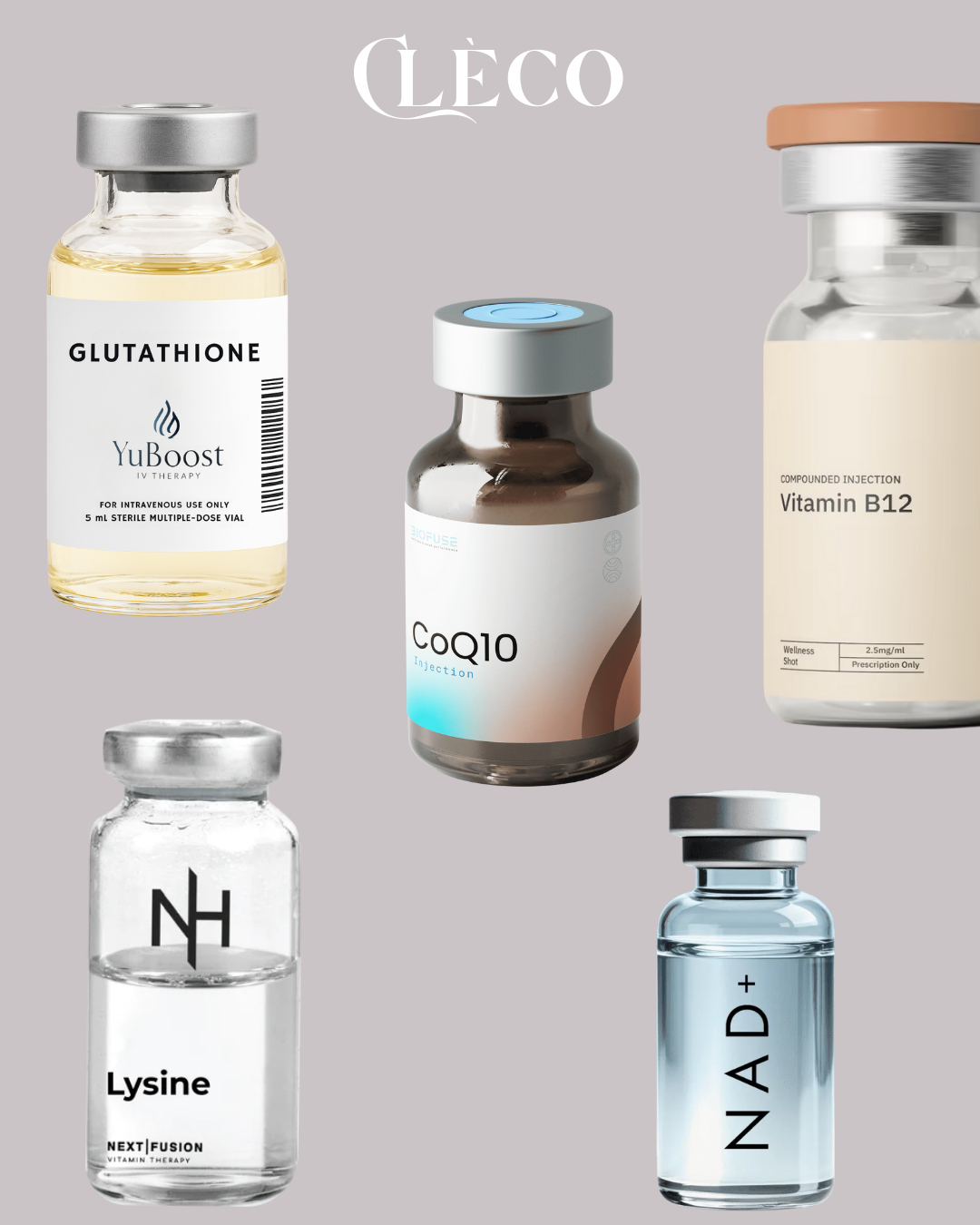How NAD+, Glutathione, CoQ10 and More Boost Skin, Mood & Metabolism—And Who Should Think Twice
Intravenous (IV) therapy has gained popularity for its potential to deliver nutrients directly into the bloodstream, promising benefits like enhanced energy, improved skin health, and immune support. However, it's essential to approach this trend with a well-informed perspective.
Key IV Nutrients & Their Benefits
1. NAD+ (Nicotinamide Adenine Dinucleotide): Best for Cellular Energy and Cognitive Function
Science: NAD+ is vital for energy production and DNA repair. IV administration ensures 100% bioavailability, directly supplying cells with this coenzyme.
Caution: Long-term effects are still under study. High doses may cause side effects like nausea or dizziness. If you're on chemotherapy, anti-anxiety meds, or managing chronic fatigue due to hormonal imbalance, NAD+ therapy may overstimulate the nervous system or interact with medications. People with active cancer, neurological conditions, or those on hormone therapy (like estrogen blockers or testosterone) should consult their physician before use.
2. Coenzyme Q10 (CoQ10): Best for Heart Health and Antioxidant Support
Science: CoQ10 supports mitochondrial function and may improve cardiovascular health.
Caution: If you're taking blood thinners (like warfarin), chemotherapy drugs, or have a history of low blood pressure, CoQ10 may interfere with your medication or cause unwanted drops in blood pressure. Always consult your physician if you’re on any cardiovascular or cancer-related treatments, or if you’re undergoing hormone therapy, as CoQ10 may impact how your body metabolizes certain drugs.
3. Vitamin B12: Best for Energy Metabolism and Nerve Function
Science: B12 deficiency can lead to fatigue and neurological issues. IV therapy can rapidly correct deficiencies.
Caution: Over-supplementation without deficiency may not provide added benefits.
4. Lysine: Best for Collagen Production and Immune Support
Science: Lysine is an essential amino acid involved in collagen synthesis and may aid in wound healing.
Caution: Excessive intake can lead to gastrointestinal discomfort. Lysine may interfere with calcium absorption and is not ideal for people with osteopenia, hypercalcemia, or those on calcium-based hormone therapies. It may also affect people with heart disease due to its interaction with arginine metabolism.
5. Glutathione: Best for Antioxidant Defense and Detoxification
Science: Glutathione neutralizes free radicals and supports liver detox processes.
Caution: IV administration should be monitored, as rapid infusion can cause side effects. Glutathione can alter melanin production, which may not be suitable for those with autoimmune skin conditions, vitiligo, or post-cancer pigmentation issues. It may also interfere with chemotherapy efficacy and should be avoided if you are on immunosuppressants or recovering from hormonal cancers.
6. Vitamin C: Best for Immune Support and Antioxidant Protection
Science: High-dose IV vitamin C has been explored for its potential in supporting immune function and as an adjunct in certain therapies.
Caution: While generally safe, high-dose Vitamin C IVs can lead to kidney stones in those with a history of oxalate sensitivity or renal issues. It may also interact with blood sugar medications and iron absorption, so avoid mega-dosing if you're anemic, diabetic, or on hormonal medications that already stress the liver or kidneys.
7. Magnesium: Best for Muscle Relaxation and Cardiovascular Health
Science: Magnesium plays a role in over 300 enzymatic reactions in the body.
Caution: High doses can cause hypotension, nausea, or cardiac issues. People with kidney disease, low heart rate (bradycardia), or those taking diuretics or calcium channel blockers should avoid magnesium IVs unless monitored. Magnesium can significantly drop blood pressure and alter electrolyte levels, especially in those on hormone-related water retention treatments.
8. Amino Acids: Best for Tissue Repair and Muscle Growth
Science: Amino acids are the building blocks of proteins and play a crucial role in various physiological processes.
Caution: Imbalances or excessive intake can strain kidney function.
Refrences:
Grant, R., et al. (2023). The clinical application of NAD+ in chronic fatigue and neurodegeneration. Journal of Cellular Metabolism.
Mayo Clinic. "Coenzyme Q10: What you need to know"
Verywell Health. "NAD+ IV Therapy: Benefits and Risks"
Harvard Health Publishing. Vitamin B12: Vital for brain health.
Point Health Clinic. "Glutathione IV Push and Detox Benefits"
NIH National Library of Medicine. Glutathione's role in cellular detoxification and oxidative stress defense.
Memorial Sloan Kettering Cancer Center. "High-dose Vitamin C"
Courage Against Cancer. High-dose IV vitamin C: Mechanisms, risks, and support. (2025)
Sponaugle Wellness Institute. "Lysine IV therapy"
Frontiers in Pharmacology. Lysine and its role in collagen synthesis and immune modulation. (2024)
Drip Hydration. "IV Magnesium: Benefits and risks"
Cleveland Clinic. Magnesium infusion for cardiovascular and anxiety support.
Journal of Neuroscience Research. Taurine’s interaction with neurotransmitters and thyroid function. (2023)
American Cancer Society. "Nutrient supplementation during cancer treatment"
NIH Office of Dietary Supplements. Safety and interactions of IV-administered vitamins and amino acids.
Hormone Health Network. "Hormone therapy: What to know before combining with supplements

